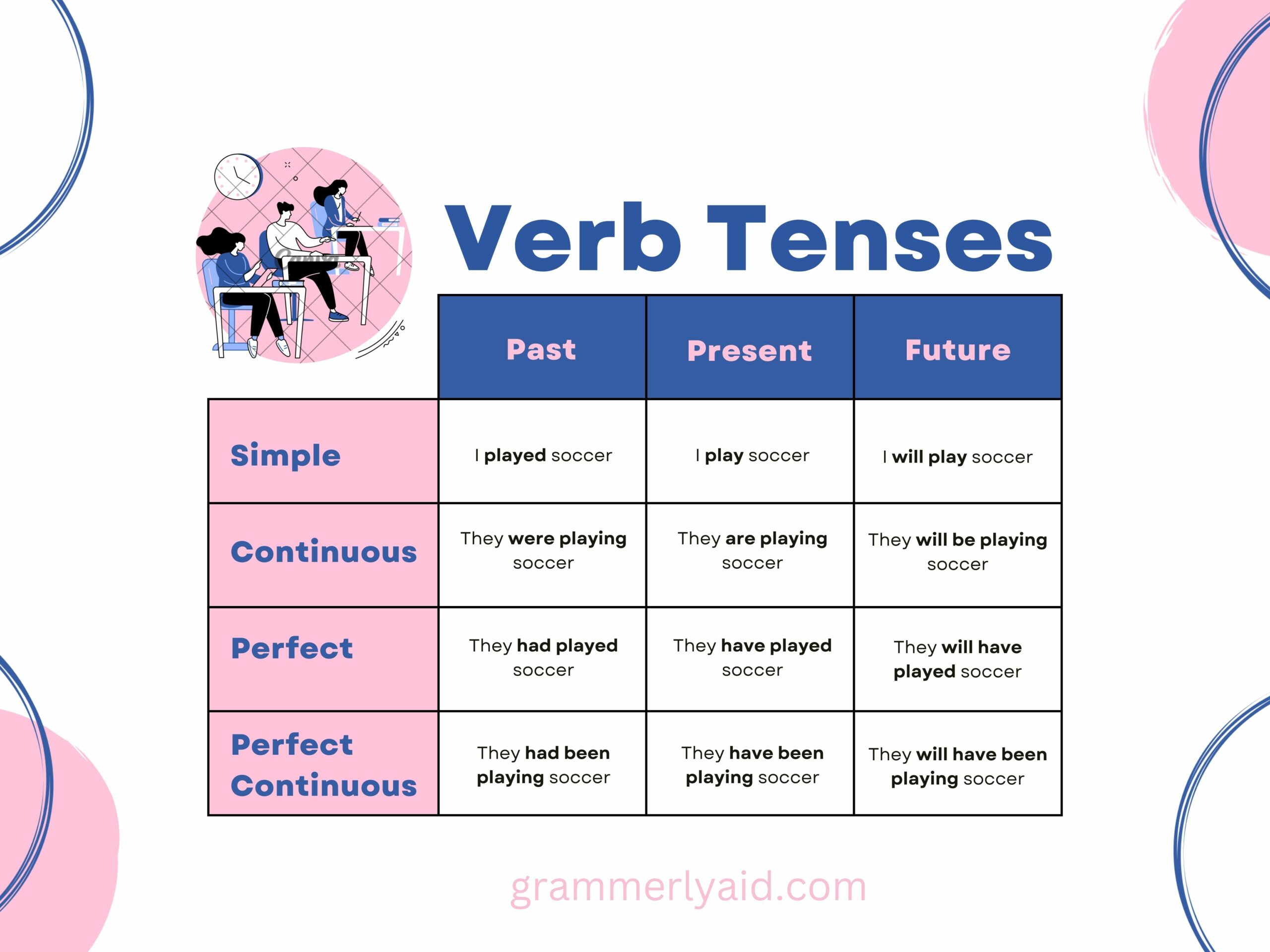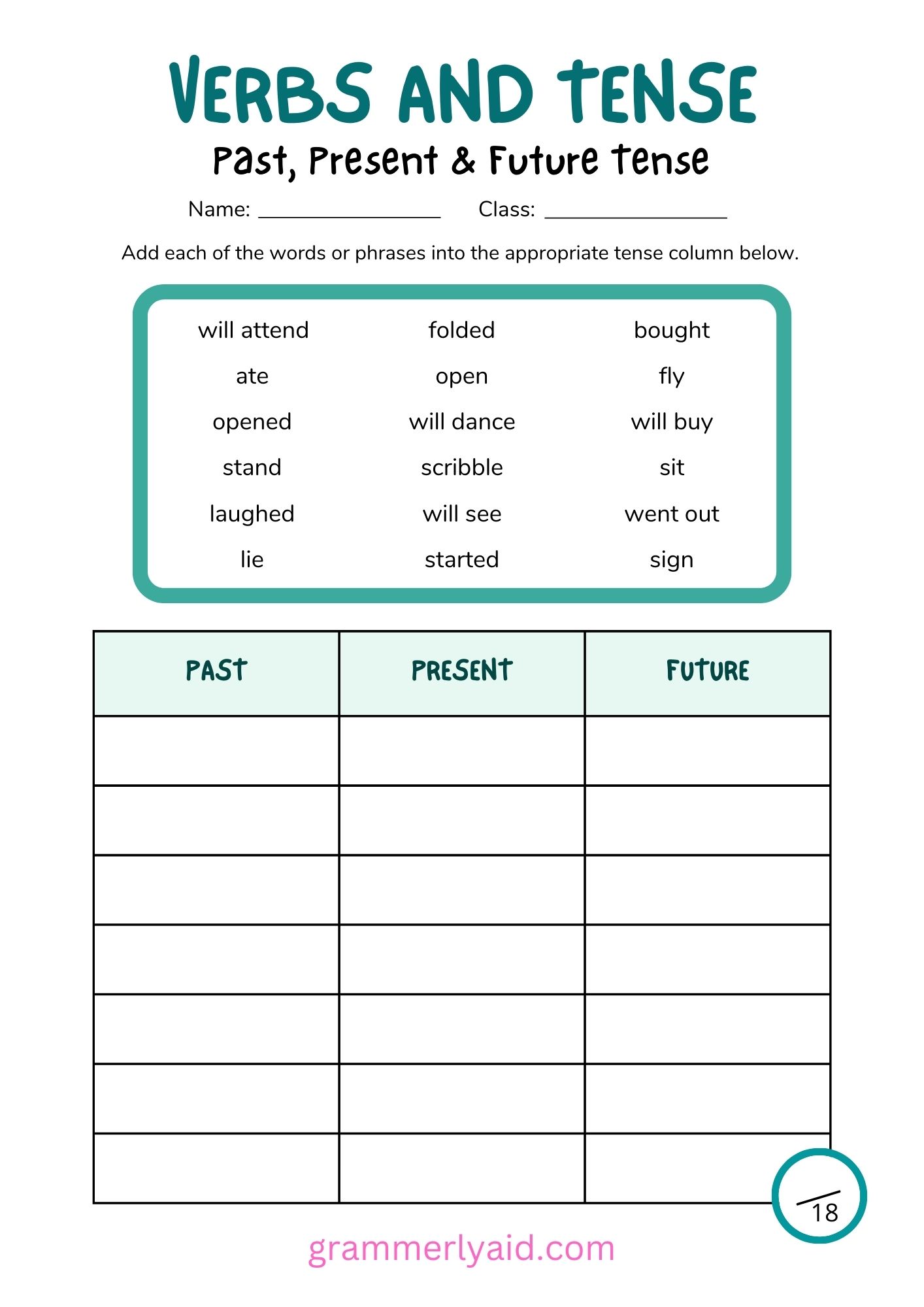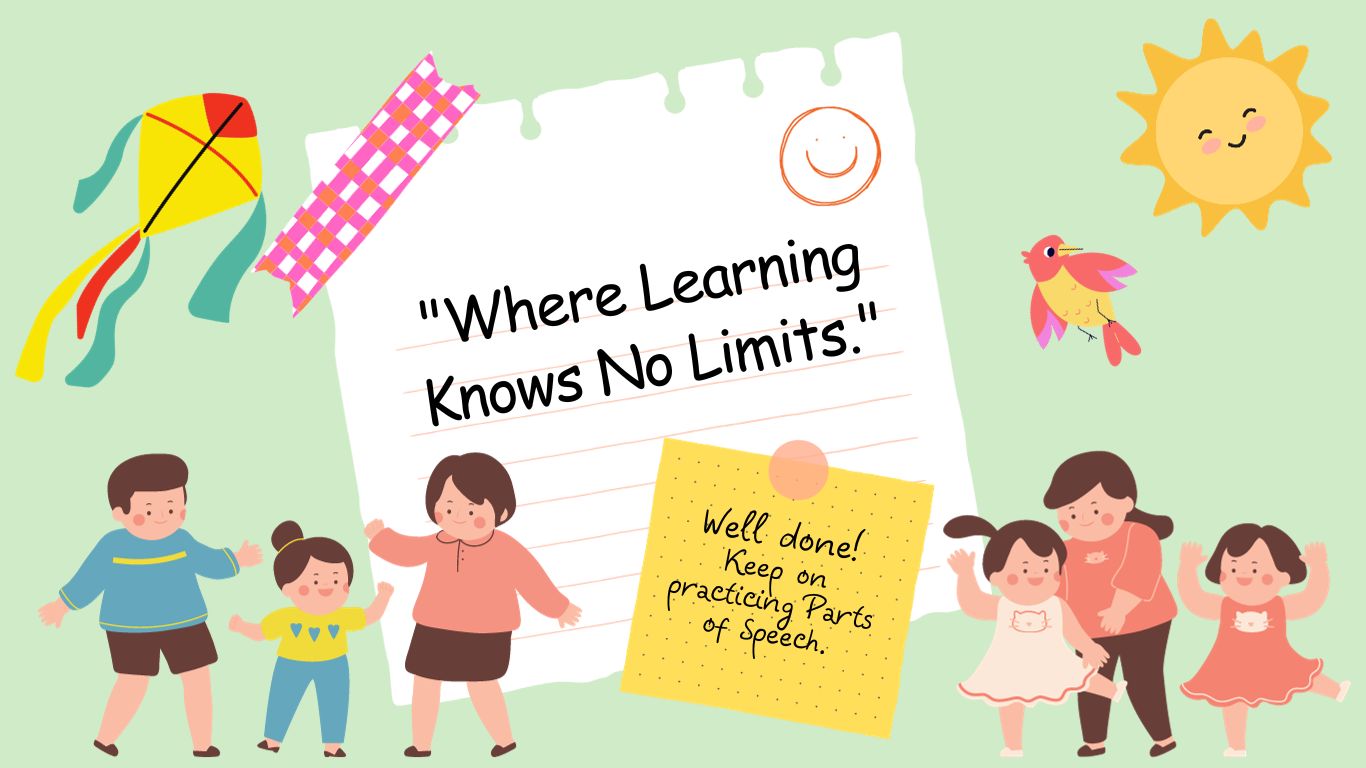Tense in English Grammar for Kids:
Tense in English grammar refers to the time of an action or an event. It helps us understand when something happened, is happening, or will happen.
There are three primary types of tenses in English:
Past, Present, and Future. Each of these tenses can be further divided into four forms: Simple, Continuous, Perfect, and Perfect Continuous. Let’s break them down for kids:

1. Present Tense:
Present tense refers to actions or states that are happening right now or are regularly occurring. There are four main types of present tense: simple present, present continuous, present perfect, and present perfect continuous.
Simple Present:
The simple present tense is a verb form that is used to express facts, general truths, habits, routines, and permanent situations. It is also employed to discuss scheduled events in the near future and to convey thoughts and opinions.
Rules:
- For most verbs, add ‘-s’ to the base form in the third person singular (he, she, it).
- Example: I walk, he walks.
- Use the base form of the verb for all other persons (I, you, we, they).
- Example: We play, you play, they play.
- Negative sentences are formed by adding ‘do not’ (don’t) or ‘does not’ (doesn’t) before the base form of the verb.
- Example: I do not like, he does not play.
- In negative sentences with ‘do not’ or ‘does not,’ the base form of the verb is used.
- Example: They do not understand.
- Questions are formed by using ‘do’ or ‘does’ at the beginning of the sentence.
- Example: Do you like pizza? Does he play the guitar
Uses:
- To express general truths and facts.
- Example: The sun rises in the east.
- For habitual actions and routines.
- Example: I go to the gym every morning.
- To state opinions and beliefs.
- Example: I think this movie is amazing.
- To describe permanent situations.
- Example: She lives in Paris.
- To express future scheduled events.
- Example: The train leaves at 8 AM tomorrow.
Worksheets:
- Fill in the blanks with the correct form of the verb:
- She __________ (reads/read) a book every night.
- They __________ (go/goes) to the park on weekends.
- I __________ (do/does) not understand the instructions.
- Does he __________ (play/plays) basketball after school?
- We __________ (watch/watches) a movie on Fridays.
- Write sentences using the simple present tense:
- __________ (I/like) to swim in the ocean.
- __________ (She/teach) English at the local school.
- My dog __________ (bark/barks) when someone knocks on the door.
- __________ (Do/you/speak) Spanish fluently?
- The sun __________ (rise/rises) in the morning.
- These worksheets can help reinforce understanding and application of the simple present tense.
Present continuous:
The present continuous tense, also known as the present progressive tense, is a verb form used to describe actions that are happening at the present moment or are in progress around the current time. It is formed by using the present tense of the verb “to be” (am, is, are) and adding the present participle (-ing form) of the main verb.
Rules:
- Form the present continuous tense by using the present tense of the verb “to be” (am, is, are) and adding the present participle (-ing form) of the main verb.
Example: I am studying, she is eating.
2.For the first person singular, use “am.” For the third person singular (he, she, it), use “is.” For all other persons, and for plural subjects, use “are.”
Example: They are playing, we are working.
3.Negative sentences are formed by adding “not” after the present tense of the verb “to be.”
Example: I am not watching TV, he is not running.
4.In negative sentences with “not,” the present participle (-ing form) of the main verb is used.
Example: They are not swimming.
5. Questions are formed by inverting the subject and the present tense of the verb “to be.”
Example: Are you studying? Is she eating?
Uses
- To describe actions happening at the present moment.
- Example: I am typing this message.
- For ongoing actions or activities around the current time.
- Example: They are playing a game right now.
- To talk about temporary actions or situations.
- Example: He is staying with us for a few days.
- To express annoyance or irritation about a repeated action.
- Example: She is always interrupting me.
- When discussing future plans or arrangements.
- Example: We are meeting for lunch tomorrow.
Worksheets:
- Fill in the blanks with the correct form of the verb:
- She __________ (is/was) studying for the exam.
- We __________ (are not/aren’t) going to the party tonight.
- Are they __________ (swim/swimming) in the pool?
- I __________ (am/are) not understanding the question.
- The children __________ (play/playing) outside.
- Write sentences using the present continuous tense:
- __________ (He/read) a magazine in the living room.
- __________ (They/dance) at the party.
- My parents __________ (cook) dinner right now.
- __________ (Is/it/rain) outside?
- We __________ (not/study) for the test at the moment.
Present perfect :
The present perfect tense is a verb form that expresses an action or state that occurred at an indefinite time in the past but has relevance to the present. It is formed by using the present tense of the auxiliary verb “have” (has for third person singular) and the past participle of the main verb.
Rules:
- Formation:
- Positive: Subject + have/has + past participle
- Negative: Subject + have/has + not + past participle
- Question: Have/Has + subject + past participle?
- Past Participles:
- Regular verbs: Add ‘-ed’ (e.g., worked, played)
- Irregular verbs: Follow specific patterns (e.g., eaten, spoken)
Uses:
- Completed Actions:
- I have finished my homework.
- She has visited Paris before.
- Experiences:
- I have never tried sushi.
- Have you ever been to a live concert?
- Unspecified Time:
- He has seen that movie.
- They have traveled to many countries.
- Multiple Actions:
- She has studied French and Spanish.
- They have worked, saved money, and now they are ready to travel.
- Recent Actions:
- I have just had lunch.
- He has already left for the airport.
Worksheets:
Exercise 1: Fill in the blanks with the correct form of the verb:
- She _________ (study) for three hours.
- They _________ (never/eat) sushi.
- Has he _________ (visit) London before?
- We _________ (not/finish) the puzzle yet.
Exercise 2: Rewrite the sentences in the present perfect tense:
- She eats pizza every Friday.
- He went to Paris in 2019.
- They know the answer.
- I saw that movie yesterday.
Exercise 3: Answer the questions in complete sentences:
- Have you ever been to a music concert?
- Has she read the latest novel by that author?
- Have they learned how to swim?
Present perfect continuous :
The present perfect continuous tense is a verb form that describes an ongoing action that started in the past, is still happening in the present, and may continue into the future. It is formed by using the present tense of the auxiliary verb “have” (has for third person singular), the past participle of the main verb “been,” and the present participle (verb + -ing) of the action verb.
Rules:
- Formation:
- Positive: Subject + have/has + been + present participle
- Negative: Subject + have/has + not + been + present participle
- Question: Have/Has + subject + been + present participle?
- Present Participle:
- Adding ‘-ing’ to the base form of the verb (e.g., working, studying)
Uses:
- Duration of an Action:
- She has been studying for three hours.
- They have been working on the project all day.
- Recent Continuous Actions:
- I have been reading this book since yesterday.
- He has been writing emails for the past hour.
- Actions Started in the Past and Continue:
- We have been living in this city for five years.
- He has been learning to play the guitar.
- Expressing Irritation or Annoyance:
- You have been talking for hours!
- Why has he been making so much noise?
Worksheets:
Exercise 1: Fill in the blanks with the correct form of the verb:
- She _________ (work) on her assignment all day.
- Have you _________ (wait) for a long time?
- They _________ (not/study) Spanish recently.
- How long _________ you _________ (learn) to play the guitar?
Exercise 2: Rewrite the sentences in the present perfect continuous tense:
- She has been reading this book since yesterday.
- We have been living in this city for five years.
- He has been working on the project all day.
- They have been practicing the piano for hours.
Exercise 3: Answer the questions in complete sentences:
- How long have you been studying French?
- Have you been waiting for a response from them?
- Why has she been making so much noise?
2. Past Tense:
Past tense is used to describe actions or states that occurred in the past. There are four main types of past tense: simple past, past continuous, past perfect, and past perfect continuous.
Simple Past Tense:
The simple past tense is a verb form used to express an action that occurred and was completed in the past. It is a straightforward way of talking about something that happened before the current moment. In simple past, regular verbs are conjugated by adding “-ed” to the base form, while irregular verbs have unique past tense forms.
Rules:
- Regular Verbs:
- Most verbs follow the rule of adding “-ed” to form the simple past tense. Example: play – played, jump – jumped, dance – danced.
- Irregular Verbs:
- Irregular verbs have unique past tense forms that don’t follow the regular “-ed” pattern. Example: go – went, have – had, eat – ate.
- Spelling Rules:
- For regular verbs ending in “e,” only “-d” is added. Example: bake – baked.
- For one-syllable verbs with a single vowel followed by a single consonant, double the final consonant before adding “-ed.” Example: hop – hopped.
- Negative Form:
- Use “did not” or the contraction “didn’t” with the base form of the verb. Example: She didn’t eat the cake.
- Question Form:
- Begin the question with “did,” followed by the base form of the verb. Example: Did you finish your homework?
Uses:
- Completed Actions:
- The simple past tense is used to describe actions that happened and were completed in the past. Example: I visited the zoo yesterday.
- Sequential Actions:
- It is used when talking about a series of events that occurred one after the other. Example: I woke up, brushed my teeth, and had breakfast.
- Habits or Routines:
- It can be used to talk about past habits or routines. Example: Every weekend, we played board games.
Worksheets:
Fill in the Blanks:
- Yesterday, I __________ (play) in the park.
- The cat __________ (hide) under the bed when it heard thunder.
- We __________ (visit) the museum last summer.
- She __________ (not, watch) TV yesterday.
- Did you __________ (eat) your lunch?
Past Continuous Tense:
The past continuous tense is a verb form used to describe actions that were ongoing or in progress at a specific point in the past. It emphasizes the duration of an action and is often used to set the scene or describe an interrupted action. In the past continuous tense, the verb “to be” (was/were) is combined with the present participle form (-ing) of the main verb.
Rules:
- Formulation:
- Use the past tense of “to be” (was/were) + the present participle (-ing) form of the main verb. Example: I was playing in the garden.
- Regular Verbs:
- Add “-ing” to the base form of regular verbs. Example: dance – dancing, jump – jumping.
- Irregular Verbs:
- Use the past tense of “to be” (was/were) + the present participle (-ing) form of the irregular verb. Example: go – was going, eat – were eating.
- Negative Form:
- Add “not” between the past tense of “to be” and the present participle. Example: She was not watching TV.
- Question Form:
- Invert the past tense of “to be” and the subject, followed by the present participle. Example: Were you eating ice cream?
Uses:
- Ongoing Actions in the Past:
- Describes an action that was happening at a specific moment in the past. Example: While I was doing my homework, the phone rang.
- Interrupted Actions:
- Indicates an action that was in progress but was interrupted by another event. Example: They were playing outside when it started raining.
- Setting the Scene:
- Sets the background or atmosphere of a past event. Example: The sun was setting as we walked along the beach.
Worksheets:
Fill in the Blanks:
- Yesterday, I __________ (read) a book when the phone __________ (ring).
- The kids __________ (play) in the park when it __________ (start) to snow.
- She __________ (not, cook) dinner because she __________ (study) for her exam.
- What __________ (you, do) when the lights __________ (go) out?
- We __________ (have) a picnic while the birds __________ (sing).
Past Perfect Tense:
The past perfect tense is a verb form used to describe an action that was completed before another action took place in the past. It indicates that one action happened before another past action, emphasizing the sequence of events. In the past perfect tense, the verb “to have” (had) is combined with the past participle form of the main verb.
Rules:
- Formulation:
- Use the past tense of “to have” (had) + the past participle form of the main verb. Example: She had finished her homework.
- Regular Verbs:
- Add “-ed” to form the past participle of regular verbs. Example: play – played – had played.
- Irregular Verbs:
- Use the past participle form of irregular verbs. Example: go – went – had gone.
- Negative Form:
- Add “not” between “had” and the past participle. Example: They had not seen the movie before.
- Question Form:
- Invert “had” and the subject, followed by the past participle. Example: Had you finished your chores before dinner?
Uses:
- Past Actions Before Other Past Actions:
- Describes an action that occurred and was completed before another action in the past. Example: By the time we arrived, she had already left.
- Narrating Past Events in Sequence:
- Emphasizes the chronological order of events in storytelling. Example: He had studied for the test before he went to bed.
- Regret or Missed Opportunities:
- Expresses regret about something that did not happen in the past. Example: I had hoped to visit the museum, but it was closed.
Worksheets:
Fill in the Blanks:
- Before the party started, they __________ (decorate) the room.
- She __________ (not, finish) her homework before the teacher collected it.
- By the time they arrived, I __________ (already, eat) dinner.
- Had you __________ (clean) your room before your parents came home?
- We __________ (never, see) snow before we visited the mountains.
Past Perfect continuous Tense:
The past perfect continuous tense is a verb form that expresses an action that was ongoing for a duration before another action took place in the past. It is formed by combining the past perfect tense of the auxiliary verb “to have” (had), the past participle form of the main verb, and “been” with the present participle (-ing) form of the main verb.
Rules:
- Formulation:
- Create the past perfect continuous tense by using “had been” + the present participle (-ing) form of the main verb. Example: She had been playing soccer for two hours before it started raining.
- Regular Verbs:
- Add “-ing” to the base form of regular verbs. Example: dance – dancing – had been dancing.
- Irregular Verbs:
- Use the present participle (-ing) form for irregular verbs. Example: go – went – had been going.
- Negative Form:
- Introduce “not” between “had” and “been,” followed by the present participle. Example: They had not been studying before the exam.
- Question Form:
- Invert “had” and the subject, followed by “been” and the present participle. Example: Had you been practicing the piano before the concert?
Uses:
- Duration of Actions Before Another Past Action:
- Describes actions that were ongoing for a period before another action in the past. Example: They had been building a sandcastle for hours before the tide washed it away.
- Narrative Tense:
- Commonly used in storytelling to emphasize the continuous nature of an action leading up to a specific point in the past. Example: When I arrived, they had been waiting at the bus stop for a long time.
- Expressing Duration:
- Highlights the duration of an activity that occurred before a certain past event. Example: She had been singing in the choir for three years before she moved to a new city.
Worksheets:
Fill in the Blanks:
- Before the party started, they __________ (decorate) the room while music __________ (play).
- She __________ (not, sleep) well because her dog __________ (bark) all night.
- By the time we got there, they __________ (already, wait) for us for an hour.
- Had they __________ (practice) the dance before the performance?
- We __________ (not, eat) because we __________ (cook) all afternoon.
3. Future Tense:
Future tense refers to actions or states that will happen in the future. There are four main types of future tense: simple future, future continuous, future perfect, and future perfect continuous.
Simple Future Tense:
The simple future tense is a verb form used to talk about actions or events that will happen in the future. It is a way of expressing plans, predictions, or intentions. In the simple future tense, the base form of the verb is used, and for most verbs, it is formed by adding “will” before the base form.
Rules:
- Formulation:
- For most verbs, use “will” + the base form of the verb.
- Example: I will play in the park.
- Negative Form:
- Introduce “not” after “will” to create the negative form.
- Example: She will not eat candy.
- Question Form:
- Invert “will” and the subject to form a question.
- Example: Will you come to my birthday party?
Uses:
- Future Plans:
- Describes actions or events that are planned to happen in the future.
- Example: Tomorrow, we will visit the zoo.
- Predictions:
- Expresses future predictions or beliefs about what will happen.
- Example: I think it will rain later.
- Promises and Intentions:
- States promises or intentions for future actions.
- Example: I will help you with your homework.
Worksheets:
Fill in the Blanks:
- Tomorrow, we __________ (go) to the beach.
- She __________ (not, forget) to bring her umbrella.
- Will you __________ (read) this book over the weekend?
- The students __________ (perform) a play next month.
- I __________ (not, tell) anyone about the surprise.
Future Continuous tense:
The future continuous tense is a verb form used to describe actions or events that will be ongoing at a specific point in the future. It emphasizes the duration of an action that is expected to happen in the future. In the future continuous tense, the auxiliary verb “will” is combined with “be” and the present participle (-ing) form of the main verb.
Rules:
- Formulation:
- Use “will be” + the present participle (-ing) form of the main verb. Example: They will be playing soccer at 4 PM.
- Negative Form:
- Introduce “not” after “will be.” Example: She will not be sleeping when we arrive.
- Question Form:
- Invert “will” and the subject, followed by “be” and the present participle. Example: Will you be studying for the test tomorrow?
Uses:
- Ongoing Actions in the Future:
- Describes actions that will be happening at a specific point in the future. Example: At 9 PM, we will be watching a movie.
- Interrupted Future Actions:
- Indicates an action that is expected to be ongoing but might be interrupted by another event. Example: At noon, they will be having lunch.
- Polite Inquiries or Offers:
- Can be used to make polite inquiries or offers about someone’s future plans. Example: Will you be needing any help with your project?
Worksheets:
Fill in the Blanks:
- At this time tomorrow, we __________ (be) at the amusement park.
- She __________ (not, sleep) because she __________ (study) for her exam.
- Will you __________ (swim) in the pool when we visit next week?
- The children __________ (play) outside while their parents __________ (prepare) dinner.
- I __________ (not, work) late tonight; I __________ (attend) a concert.
Future Perfect Tense:
The future perfect tense is a verb form used to express actions that will be completed before a specific point in the future. It emphasizes the idea that an action will be finished before another future action or event. In the future perfect tense, the auxiliary verb “will have” is combined with the past participle form of the main verb.
Rules:
- Formulation:
- Use “will have” + the past participle form of the main verb. Example: By next summer, I will have visited three different countries.
- Negative Form:
- Introduce “not” after “will have.” Example: She will not have finished her project by tomorrow.
- Question Form:
- Invert “will” and the subject, followed by “have” and the past participle. Example: Will you have completed your homework by the time I arrive?
Uses:
- Completed Actions Before a Future Point:
- Describes actions that will be completed before a specific point in the future. Example: By the end of the week, they will have painted the entire room.
- Predictions or Assumptions About Future Actions:
- Expresses predictions or assumptions about actions that are expected to be completed by a certain time in the future. Example: I believe she will have read the entire book by the time we meet again.
- Emphasizing Completion:
- Emphasizes the completion of an action by a specific future point. Example: By the time you wake up, I will have baked cookies for breakfast.
Worksheets:
Fill in the Blanks:
- By next month, we __________ (visit) our grandparents.
- They __________ (not, finish) the puzzle by the time the guests __________ (arrive).
- Will you __________ (complete) your chores before the party starts?
- The students __________ (study) for the exam for three hours by the time the bell __________ (ring).
- I __________ (not, read) the entire book by the time the movie __________ (start).
Future Perfect Continuous Tense:
The future perfect continuous tense is a verb form used to describe actions that will have been ongoing for a specific duration before a particular point in the future. It emphasizes the continuous nature of an action leading up to a future time. In the future perfect continuous tense, the auxiliary verb “will have been” is combined with “be” and the present participle (-ing) form of the main verb.
Rules:
- Formulation:
- Use “will have been” + “be” + the present participle (-ing) form of the main verb. Example: By next month, I will have been practicing the piano for six months.
- Negative Form:
- Introduce “not” after “will have been.” Example: She will not have been studying for the test all day.
- Question Form:
- Invert “will” and the subject, followed by “have been,” “be,” and the present participle. Example: Will you have been playing video games for an hour by the time I come back?
Uses:
- Ongoing Actions Leading Up to a Future Point:
- Describes actions that will have been ongoing for a duration leading up to a specific point in the future.
- Example: By the time we arrive, they will have been waiting for us at the restaurant.
- Emphasizing Duration:
- Highlights the continuous nature and duration of an activity leading up to a future event.
- Example: By the end of the day, I will have been gardening for five hours.
- Predictions or Assumptions About Future Actions:
- Expresses predictions or assumptions about continuous actions expected to be ongoing until a particular time in the future.
- Example: I believe they will have been traveling for days when they reach their destination.
Worksheets:
Fill in the Blanks:
- By next summer, she __________ (learn) how to swim for three years.
- They __________ (not, play) video games for the whole day by the time their parents __________ (return).
- Will you __________ (practice) your dance routine before the recital?
- The construction workers __________ (work) on the building for six months when it __________ (be) completed.
- I __________ (not, study) the language for very long when I __________ (be) able to have a conversation.

Conclusion:
In conclusion, understanding tenses can be an exciting journey for kids as they embark on the adventure of language learning. Tenses provide the tools to express actions in relation to time, allowing young learners to convey when something happened, is happening, or will happen. From the simplicity of the present tense, indicating what’s occurring now, to the narrative richness of the past and the anticipation of the future, each tense serves a unique purpose in storytelling and communication.

Future Perfe

